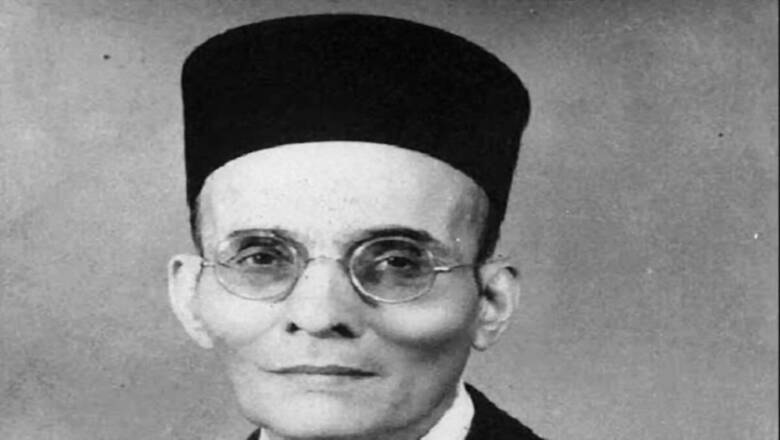
views
For some weeks now, the BJP’s opponents have been calling upon voters to halt Narendra Modi’s march towards a third term. These BJP critics believe that if returned to power, the Modi government will rewrite the Constitution that India gave itself in 1947.
Modi’s critics believe that the new republic will rise post-2024, built on the foundations of a new Constitution, fashioned after the allegedly “Hindu exclusivist” impulses of the BJP’s ideological mentor VD Savarkar.
Savarkar, the founder of the Hindu Mahasabha, is loathed by the ideological Left for birthing Hindutva – a supposedly divisive ideology that, according to them, spawned Hindu majoritarianism.
It is true that Savarkar was an unabashed champion of Hindutva and a Hindu Rashtra. But would his vision for Hindustan (he was disinclined to use the term Bharat) undo equal citizenship and minority protections that Dr Ambedkar and his fellow constitutional draftsmen had woven into the warp and weft of India’s social fabric?
It would be worth answering this question on VD Savarkar’s punyatithi (death anniversary).
As Savarkar’s biographer, Vikram Sampath writes, the ideologue’s views on Hindutva were influenced greatly by some events in his time. Savarkar was disillusioned with Mahatma Gandhi’s support for a pan-Islamist Khilafat movement, outraged by the brutal Moplah massacre of Hindus in the Malabar region and expressed growing concern over repeated concessions granted to the Muslim League, including separate electorates that he believed only weakened the nationalist movement. Savarkar was particularly pained by the assassination of Swami Shraddhanand, chief campaigner of Shuddi (movement for the reconversion to Hinduism) by one Abdul Rashid, whom Mahatma Gandhi would refer to as a ‘dear brother’.
Fearing that these events would produce fissiparous tendencies among the body politic, Savarkar defined Hindutva as “nationalism led by cultural integration”. To Savarkar then, the essentials of Hindutva were “a common nation (Rashtra), a common race (Jati) and a common civilisation (Sanskriti). All these essentials could best be summed up by stating in brief that he is a Hindu to whom Sindhustan is not only a Punyabhu (Holy land).”
As is clear, Savarkar’s Hindutva was inclusive to the extent that it considered Jains, Buddhists and Sikhs as Hindus, since the birthplace of their religion (Holy Land) was India. But did it automatically exclude Muslims, Christians, Jews and Parsis?
Though Savarkar saw their ‘divided love’ as an obstacle to integration, he called upon non-Hindus to become a part of the ‘Hindu fold’ by voluntarily pledging their ‘love’ to a ‘common Mother’ and recognise India not only as Pitribhu (fatherland) but also as Punyabhu (Holy land). He cited the examples of Sister Nivedita and Annie Besant, who had devoted themselves to the cause of India’s freedom, as examples of those whose Christian birth did not disqualify them from being considered Hindus.
But did Savarkar’s seemingly exclusionary idea of nationhood influence his vision of what the Indian state ought to be? Not quite.
At least there’s no sign of it in the draft constitution drawn up by the Hindu Mahasabha. The document borrowed heavily from the ideas of Savarkar who founded the organisation.
The Constitution of the Hindusthan Free State (HFS) guaranteed the fundamental right to equality and free expression. It guaranteed the right to propagate and practice one’s religion under a democratic government elected by universal adult franchise. But above and beyond, this constitution categorically ruled out any state religion for the Hindusthan Free State or any of its provinces. In other words, by inference, it was secular in its outlook.
Given that this constitution was drawn up by an organisation founded by Savarkar and avowedly committed to Hindutva, it puts paid to the Left’s claims that had he had his way, India would have been a “Hindu Pakistan”.
Though nothing can be definitively said about the future, a Savarkarite constitution certainly allays fears that the BJP would be naturally inclined towards drafting one that would abandon the road to republicanism and secularism.
Views expressed in the above piece are personal and solely that of the author. They do not necessarily reflect News18’s views.




















Comments
0 comment